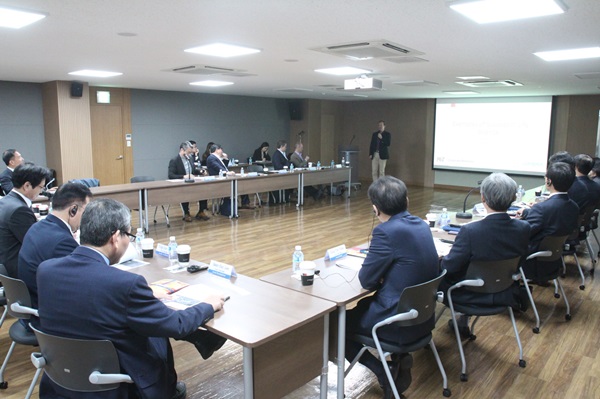“In Boston, corporations are making successful cases through collaboration with universities, government agencies, and startup firms. We have great anticipation for Korean pharmaceutical companies to join us through a consortium with the pharmaceutical industry association.”
John Roberts, Director of Corporate Relations at Massachusetts Institute of Technology (MIT), said so and explained about MIT Industrial Liaison Program (ILP) in a meeting with local drugmakers arranged by the Korea Pharmaceutical and Bio-Pharma Manufacturers Association (KPBMA) in Seoul, Tuesday.

KPBMA Chairman Won Hee-mok vowed to support Korean firms’ participation in global open innovation at a news conference earlier this year.
The Tuesday meeting with MIT officials was the association’s first move to push for global open innovation.
MIT ILP, a collaboration program between scholars and businesses, has over 260 corporate members around the world. The program provides a network for high-tech commercial performance, based on over 150 laboratories, 3,000 faculty and researchers, and more than 1,800 startups in Kendall Square, Boston.
In November, Won visited MIT in Boston to discuss how to encourage Korean pharmaceutical firms to participate in open innovation overseas.
This time, MIT officials in life sciences and CEOs of AI-based new drug developing startups visited Seoul to gauge the demand of Korean companies and introduce the industrial-academic cooperation program.
Roberts introduced successful examples of life science firms that joined the MIT ILP.
Korean pharmaceutical and biotech firms can also meet MIT professors and U.S. startups individually, and participate in related conferences, he said.
MIT ILP’s Startup Exchange Program provides over 600 business meetings a year. The program allocates a program director to each company, helping it to hold several meetings with researchers and startups a day.
Japan’s Takeda Pharmaceutical joined MIT ILP in 2014. Through various business meetings, the company is working on anticancer drugs with the Koch Institute for Integrative Cancer Research at MIT.
One pharmaceutical firm clinched a partnership deal with a startup with a biomarker technology to maximize the efficiency of clinical trials. Another decided to team up with a startup that has a raw material synthesis technology.
“Because there are so many professors and startups, you can find an excellent partner unexpectedly,” Roberts said. “Before you come to MIT and experience it yourself, you might not know how this is important. But there are many opportunities in Kendall Square in Boston to maximize business efficiency and grow quickly.”
KPMBA said it would form a consortium with local drug companies to participate in MIT ILP.
It is the first time that MIT ILP to seek a consortium in the pharmaceutical and biotech sector. The consortium will lower the cost for annual membership fees for individual companies and encourage more active participation and support, the association said.

